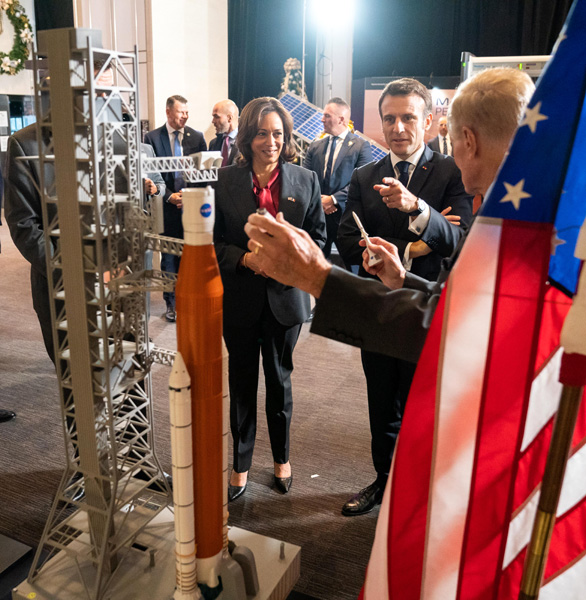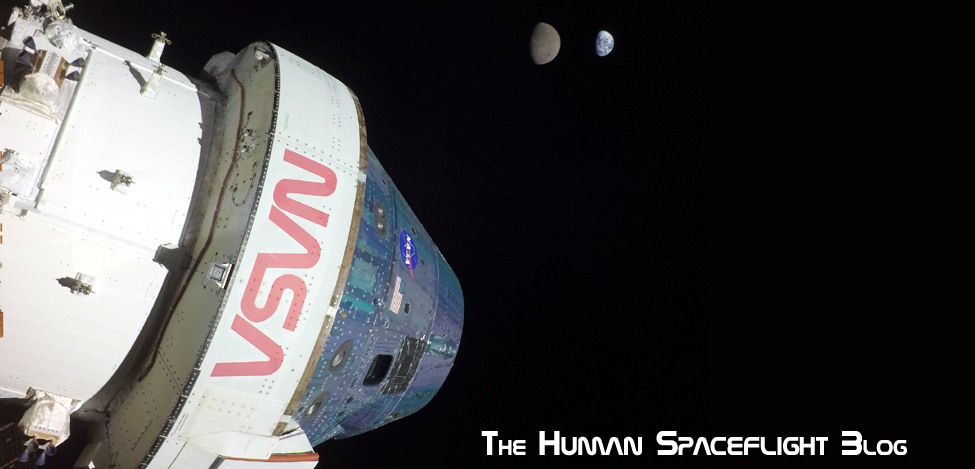
Photo courtesy of Vice President Kamala Harris - Twitter.com
U.S. Vice President, French President Visit NASA Headquarters (Press Release - November 30)
NASA Administrator Bill Nelson welcomed Vice President Kamala Harris and French President Emmanuel Macron to NASA Headquarters in Washington Wednesday, where they participated in a working meeting and briefing by U.S. and French experts on U.S.-France cooperation in exploration, Earth and space science.
U.S. Department of Commerce Deputy Secretary Don Graves and National Oceanic and Atmospheric Administration (NOAA) Administrator Rick Spinrad were also in attendance.
At the briefing, Harris and Macron focused on the success of the two nations’ collaboration in space, including the James Webb Space Telescope, the Surface Water Ocean Topography mission, the Space for Climate Observatory, the International Space Station and Artemis. They were briefed by the head of NASA’s Earth Science Division, Karen St. Germain, Centre National d'Etudes Spatiales (CNES) President Phillipe Baptiste, NOAA Senior Scientist Mitch Goldberg, Associate Astronomer at the Space Telescope Science Institute Rémi Soummer, NASA astronaut Ricky Arnold, ESA (European Space Agency) astronaut Thomas Pesquet and NASA’s Assistant Deputy Associate Administrator for Exploration Systems Development Mission Directorate Amit Kshatriya.
“Today we have the occasion to celebrate the cooperation of our two nations in space... Today we build on the progress we have made and today we will also identify additional areas of collaboration and cooperation,” Harris said. “Space remains a place of undiscovered and unrealized opportunity. For that reason, there is so much potential in terms of the work that nations can do there, in particular when we work together based on shared principles and values.”
Harris and Macron also received a first look at new imagery and video from the Artemis I mission and Webb images, a merging galaxy pair, and a new composite image of the Pillars of Creation. The image from Orion was taken from a camera at the end of a solar array on the spacecraft’s service module, provided by ESA, on flight day 13 when Orion reached its maximum distance from Earth, 268,563 miles away from our home planet. Webb captured both of the new images using a pair of its cutting-edge instruments: NIRCam — the Near-Infrared Camera — and MIRI, the Mid-Infrared Instrument, which was contributed by ESA and NASA.
“France is one of the United States’ closest allies – on Earth and in space. It was an honor to host Vice President Harris and President Macron at NASA Headquarters, where they heard from some of the brightest minds from our two nations,” said Nelson. “The U.S.-French partnership in space not only gives us a better understanding of our universe and our place within it, but it also strengthens democracy, climate security and stability around the globe. I look forward to continuing to work with our international partners to develop opportunities for our citizens and demonstrate ingenuity and integrity to the world.”
Following the meeting with Harris, the Department of Commerce hosted Macron and Nelson at a roundtable with representatives from U.S. and French commercial space companies to highlight how collaboration has helped enable growth of both nations’ space sectors, as well as discussed ways in which the nations can continue to work together to advance private-public partnership in space.
Nelson and Baptiste also signed an agreement Wednesday for the Farside Seismic Suite (FSS), which will return the first lunar seismic data from the far side of the Moon. CNES is contributing one of the seismometers to this payload, which will be delivered via NASA’s Commercial Lunar Payloads Services (CLPS) initiative, based on heritage capabilities from the Mars InSight mission.
****
As I said with President Macron, we have unrealized opportunity in space. From using satellite technology and data to tackle the climate crisis, to establishing international rules and norms, we are proud to partner with France. pic.twitter.com/qQeB8fDY8I
— Vice President Kamala Harris (@VP) December 1, 2022

No comments:
Post a Comment